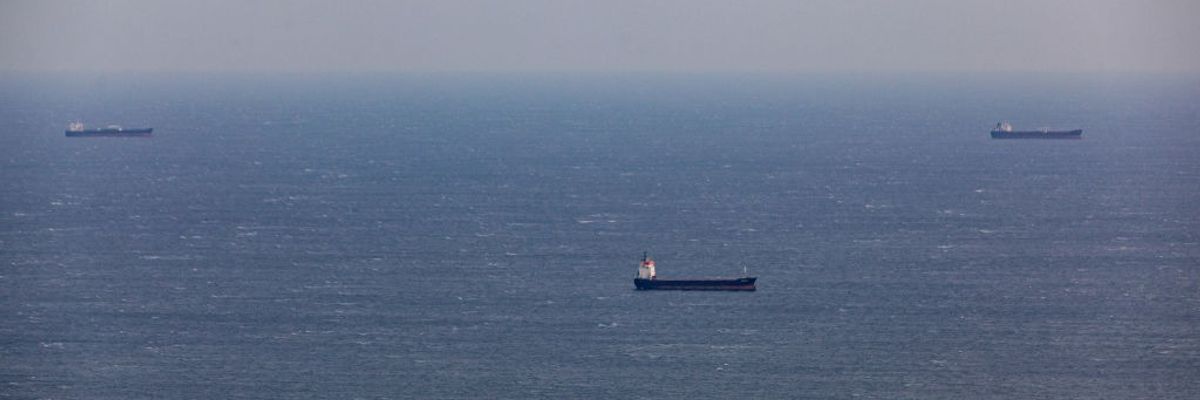The United States is waging an illegal war in Yemen, where major shipping routes along the country’s coastlines have been disrupted by ongoing violence in the region.
Despite widespread understanding in Washington that U.S. military operations in Yemen violate U.S. law, U.S. officials continue to insist that they must continue their military campaign, which they say is necessary to saving time and money on commercial shipping through the Middle East.
“The U.S. economy relies on open sea lanes,” U.S. General Michael Kurilla, the commander of U.S. Central Command, said at a March 7 Senate hearing, after being asked about the growing U.S. military presence in the Red Sea. “By our national security strategy, we will not allow a state or non-state actor to affect the freedom of navigation in the Strait of Hormuz, the Bab al Mandeb, or the Suez Canal.”
Although some of the Houthis’ attacks have caused casualties, the major concern in Washington has been the implications for the global economy.
Since January 11, the United States has been directing airstrikes and other military operations in Yemen. U.S. military forces have been targeting the Houthis, a militant group that has been launching missiles and other attacks against commercial vessels in the Red Sea, Bab al Mandeb, and Gulf of Aden.
For months, the Houthis’ attacks have disrupted commercial shipping. The Houthis have insisted that they will continue their attacks until Israel ends it military offensive in Gaza.
Although some of the Houthis’ attacks have caused casualties, the major concern in Washington has been the implications for the global economy. As U.S. officials have repeatedly noted, as much as 15% of global trade passes through the Red Sea, including 12% of the sea-based oil trade.
“The reason it’s so important there is this,” Secretary of State Antony Blinken explained earlier this year. “15% of commercial traffic is going through that strait every single day.” That includes “30% of the world’s container ships.”
Of particular concern to U.S. officials is the Bab al Mandeb, a narrow strait along the southwestern coast of Yemen that connects the Red Sea to the Gulf of Aden. An estimated 8.8 million barrels of oil are shipped through the strait every day, making it one of the world’s “strategic chokepoints,” as Gen. Kurilla described it.
Although the White House has insisted that President Joe Biden has the legal authority to take military action against the Houthis, several members of Congress have refuted its claims. At a Senate hearing in February, several senators called attention to the War Powers Resolution, which establishes that the president cannot continue hostilities for longer than 60 days without approval from Congress.
Regardless, Congress has failed to act, even now that the deadline has passed. March 12, the day that the White House was required to cease its military operations, “came, and went, in public silence,” as The Associated Press reported.
Even as the Biden administration and Congress move forward with an illegal war, there are alternatives to addressing the Houthi attacks on commercial shipping.
As some U.S. officials have acknowledged, the ideal and perhaps most obvious alternative would be to achieve a cease-fire in Gaza. After all, the Houthis continue to insist that they will not end their attacks until Israel ends its siege of Gaza.
“I am very keen to see that there is a cease-fire in Gaza,” U.S. Special Envoy to Yemen Timothy Lenderking said during a March 29 appearance on “Washington Journal.” “I do believe that we can use that moment to deescalate some of these other crises, including the Red Sea. We must get to that moment.”
Absent a cease-fire, however, it remains possible for commercial ships to circumvent the Middle East. Data compiled by the International Monetary Fund indicates that maritime trade is being redirected around Africa. In other words, commercial ships are taking advantage of other options for reaching their destinations.
The Biden administration has opposed both approaches, however. Not only has the administration continued to support Israel’s military offensive in Gaza, despite its acknowledgment of the worsening “humanitarian catastrophe,” as Secretary of Defense Lloyd Austin recently described it, but the administration remains unwilling to tolerate the longer shipping times that are associated with the route around Africa.
“If you’re talking oil that comes through, we’re seeing a diversion of that,” Gen. Kurilla said at the March 7 Senate hearing. “It goes around the Cape of Good Hope. What that’s going to do is bring products late to market and price increases as well.”
Indeed, the priority of U.S. officials is to keep the Red Sea open for shipping. Their determination to maintain faster shipping is leading them to move forward with a war in Yemen that they know is illegal, even as they come to recognize more sensible options.
The first step in getting to a “just settlement” in Yemen “is the cease-fire in Gaza,” Lenderking said. “I think we can use that diplomatically to deescalate the situation in the Red Sea.”

